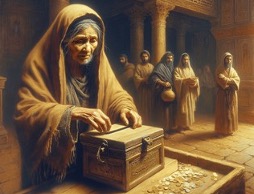Jesus was always quick to expose hypocrisy – it was a kind of archenemy of his. He named it, shamed it and revealed it. The Lord showed no reservation in highlighting the inconsistency of the scribes and Pharisees and warned us to beware of them; for they prayed long and loud so that they might be identified as the ‘holy ones’, whilst at the same time they ‘devoured widows’ houses.’ This hypocrisy revealed a cold heart towards God and others, rendering their prayer empty and hollow. Interestingly the Torah condemned this attitude: ‘You shall not wrong a stranger…You shall not afflict any widow or orphan. It is against this background of duplicity and hypocrisy that the poor widow enters the scene. She is the model disciple – dependent upon God, simple in faith, trusting and lavishly generous, giving out of her poverty not her wealth. This is the kind of faith we are called to, the fruit of our baptism, and bears witness to the new creation, a new humanity.
However, before we get too carried away, we need to reflect. The scribe and the Pharisee lurk all in our hearts. We may not devour widows’ houses, but there is a drive in the human heart to want to be affirmed and recognised for our righteousness and holiness. We all face this temptation – but it is especially real for our clergy who are esteemed because of their vocation.
Before God we are all equal – we are all widows and beggars before God’s throne. Before the judgement seat of Christ, we will not be asked: were you a priest, were you a deacon, were you a Bishop? We will be asked whether we loved God and our neighbour as we loved ourselves. We cannot know, because the widow only spoke through her witness, but we can be sure that they had received and knew intimately the mercy of God in her own life. She was a believer rooted in the sure knowledge of God’s love and mercy, and this overflowed in her generous life and witness.


